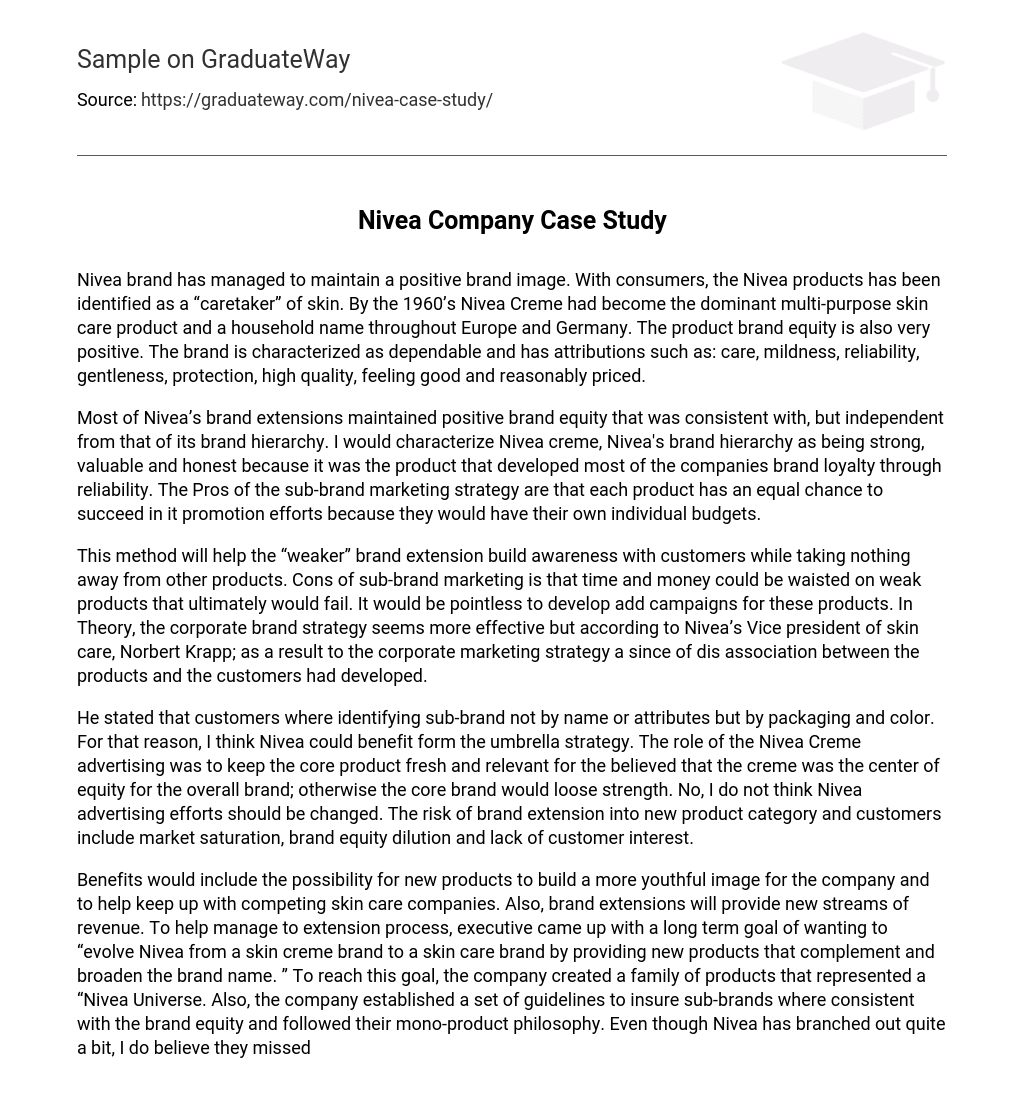Nivea brand has managed to maintain a positive brand image. With consumers, the Nivea products has been identified as a “caretaker” of skin. By the 1960’s Nivea Creme had become the dominant multi-purpose skin care product and a household name throughout Europe and Germany. The product brand equity is also very positive. The brand is characterized as dependable and has attributions such as: care, mildness, reliability, gentleness, protection, high quality, feeling good and reasonably priced.
Most of Nivea’s brand extensions maintained positive brand equity that was consistent with, but independent from that of its brand hierarchy. I would characterize Nivea creme, Nivea’s brand hierarchy as being strong, valuable and honest because it was the product that developed most of the companies brand loyalty through reliability. The Pros of the sub-brand marketing strategy are that each product has an equal chance to succeed in it promotion efforts because they would have their own individual budgets.
This method will help the “weaker” brand extension build awareness with customers while taking nothing away from other products. Cons of sub-brand marketing is that time and money could be waisted on weak products that ultimately would fail. It would be pointless to develop add campaigns for these products. In Theory, the corporate brand strategy seems more effective but according to Nivea’s Vice president of skin care, Norbert Krapp; as a result to the corporate marketing strategy a since of dis association between the products and the customers had developed.
He stated that customers where identifying sub-brand not by name or attributes but by packaging and color. For that reason, I think Nivea could benefit form the umbrella strategy. The role of the Nivea Creme advertising was to keep the core product fresh and relevant for the believed that the creme was the center of equity for the overall brand; otherwise the core brand would loose strength. No, I do not think Nivea advertising efforts should be changed. The risk of brand extension into new product category and customers include market saturation, brand equity dilution and lack of customer interest.
Benefits would include the possibility for new products to build a more youthful image for the company and to help keep up with competing skin care companies. Also, brand extensions will provide new streams of revenue. To help manage to extension process, executive came up with a long term goal of wanting to “evolve Nivea from a skin creme brand to a skin care brand by providing new products that complement and broaden the brand name. ” To reach this goal, the company created a family of products that represented a “Nivea Universe. Also, the company established a set of guidelines to insure sub-brands where consistent with the brand equity and followed their mono-product philosophy. Even though Nivea has branched out quite a bit, I do believe they missed the opportunity to expand in the foot care market since it still falls under the category of skin care. I do not think that Nivea should go outside of the boundaries of skin care products, a perfume may not be a strong market for them because of their deeply rooted reputation of being care takers. As far as a mens grooming line, Nivea already has a mens razor that moisturizes the skin.
I think it would be a great idea to expand that line and make more grooming tools for men. Mens hair dye may also be a good idea. In doing a mens grooming line I dont think it would negatively effect the customer base, it would simply add a new market (which is what the long term plan wanted to do). If I where a Nivea executive, I would create a plan to target the younger demographic in an effort to keep the brand relevant. With competitors such as Revlon, Pro Active and L’Oreal it is important to keep the brand fresh or it will be overshadowed and eventually die out.





